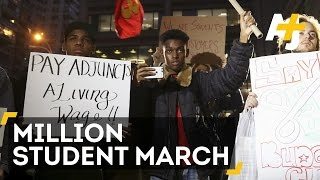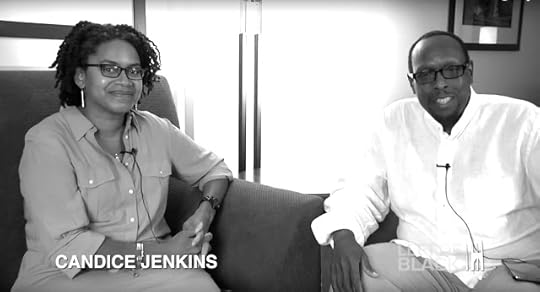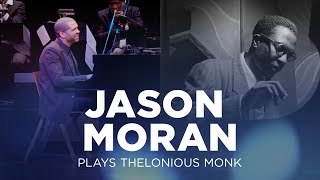Mark Anthony Neal's Blog, page 677
November 14, 2015
Million Student March Against Student Debt
 'Students at 110 college campuses across the U.S. walked out class to protests the nation's ballooning $1.2 trillion student debt. The #MillionStudentMarch called for tuition-free public college, debt cancellation and a $15/hr minimum wage for campus workers.' -- +AJ+
'Students at 110 college campuses across the U.S. walked out class to protests the nation's ballooning $1.2 trillion student debt. The #MillionStudentMarch called for tuition-free public college, debt cancellation and a $15/hr minimum wage for campus workers.' -- +AJ+
Published on November 14, 2015 16:49
Left of Black S6:E9: Who Gets to Tell Our Story? Ta-Nehisi Coates + the Authoring of the Black Experience
 Left of Black S6:E9: Who Gets to Tell Our Story? Ta-Nehisi Coates + the Authoring of the Black Experience
Left of Black S6:E9: Who Gets to Tell Our Story? Ta-Nehisi Coates + the Authoring of the Black ExperienceLeft of Black host and Duke University Professor Mark Anthony Neal (@NewBlackMan) is joined on location in Durham, NC by Candice M. Jenkins, Associate Professor of English and African American Studies at the University of Illinois at Urbana-Champaign. Jenkins is the author of Private Lives, Proper Relations: Regulating Black Intimacy (University of Minnesota Press, 2007).Left of Black is a weekly Webcast hosted by Mark Anthony Neal and produced in collaboration with the John Hope Franklin Center at Duke University and in conjunction with the Center for Arts, Digital Culture & Entrepreneurship (CADCE).
***
Episodes of Left of Black are also available for free download in @ iTunes U
***
Follow Left of Black on Twitter: @LeftofBlack
Published on November 14, 2015 13:49
#ThatSanctifiedBling: Anthony Hamilton & The Hamiltones cover Drake's "Hotline Bling"
Published on November 14, 2015 13:03
Anthony Hamilton & The Hamiltones cover Drake's "Hotline Bling"
Published on November 14, 2015 13:03
November 13, 2015
#FlashBlackFriday: "One Nation Under a Groove" (1978) -- Funkadelic
Published on November 13, 2015 08:29
November 11, 2015
Shonda Rhimes On Running 3 Hit Shows And The Limits Of Network TV
 'Shonda Rhimes, the force behind ABC's Grey's Anatomy, Scandal and How to Get Away with Murder says she has fought to get important images — like same-sex couple love scenes — on air.' -- +NPR
'Shonda Rhimes, the force behind ABC's Grey's Anatomy, Scandal and How to Get Away with Murder says she has fought to get important images — like same-sex couple love scenes — on air.' -- +NPR
Published on November 11, 2015 21:06
Jazz Night in America: Jason Moran Plays Thelonious Monk
 '"Thelonious Monk is the most important musician. Period!" That's pianist Jason Moran on "the first pianist who made me want to be a pianist." So Moran decided to present a personal reflection on Monk's music, reconfiguring the 1959 large ensemble concert that Monk presented at Town Hall in New York City.' +Jazz Night in America
'"Thelonious Monk is the most important musician. Period!" That's pianist Jason Moran on "the first pianist who made me want to be a pianist." So Moran decided to present a personal reflection on Monk's music, reconfiguring the 1959 large ensemble concert that Monk presented at Town Hall in New York City.' +Jazz Night in America
Published on November 11, 2015 20:52
#MyVeteransDay--Bob Marley + The Wailers: "Buffalo Soldier" (1983)
Published on November 11, 2015 08:48
“Everything I Do Gonna Be Funky”: The Genius of Allen Toussaint by Charles L. Hughes
 “Everything I Do Gonna Be Funky”: The Genius of Allen Toussaintby Charles L. Hughes | @CharlesLHughes2 | special to NewBlackMan (in Exile)
“Everything I Do Gonna Be Funky”: The Genius of Allen Toussaintby Charles L. Hughes | @CharlesLHughes2 | special to NewBlackMan (in Exile)Allen Toussaint died on November 9th after a performance in Madrid. Since then, the outpouring of affection, respect and sadness has been seismic, a fitting testament to his profound impact as a cornerstone of the pivotal R&B and soul scene in New Orleans. Over several decades and countless remarkable recordings, Toussaint’s distinctive and expansive genius transformed the culture of the world.
Born in New Orleans in 1938, Toussaint grew up steeped in the music that made the city an internationally-recognized symbol for innovation and creativity. An early fan of local piano wizard Professor Longhair, he was gigging by high school and playing sessions for legendary producer Dave Bartholomew, who shaped hits by Fats Domino and others in the Crescent City’s rock ‘n’ roll boom of the 1950s. Toussaint learned the craft of record-making quickly, and – though he cut solo records in these early days – he soon became essential behind the scenes as one of the city’s most successful producers, songwriters and piano players.
Throughout the 1960s and 1970s, Toussaint made supple and sophisticated records that mixed New Orleans traditions with the expansive possibilities of black pop. His fluid, piano-driven arrangements – with clear inflections of jazz, blues and Latin music – provided perfect backing for the city’s great vocalists, like longtime collaborator Lee Dorsey or soul queen Irma Thomas. Though skilled in ballads, Toussaint became particularly successful with up-tempo tracks that sometimes (like in Dorsey’s “Working In A Coal Mine” or Ernie K-Doe’s “Mother-In-Law”) masked a quiet desperation just underneath their playfully funky exterior.
The funk got thicker as the 1970s approached, when Toussaint hired a group of young musicians called The Meters to be his studio’s house band. Toussaint produced the group’s pivotal early records, including hits like “Sophisticated Sissy,” and used them on genre-defining classics like Labelle’s “Lady Marmalade” and Aaron Neville’s “Hercules.” Unsurprisingly, Toussaint also attracted the attention of white artists in this period, when his songs and arrangements energized records by The Band, Bonnie Raitt and others. From rock ‘n’ roll through disco, Allen Toussaint played a direct role in shaping the contours of African-American music.
His importance has extended into the hip-hop era thanks to his popularity as a source of samples. Hits ranging from Amerie’s “1 Thing” to Biz Markie’s “Just A Friend” are built around Toussaint-related tracks, and celebrated producers from across hip-hop’s generational and geographical spectrum have utilized Toussaint’s productions of The Meters, Lee Dorsey and others. As Questlove noted, “Hip hop heads still salivate over all #TheMeters tunes he produced,” and his drum tracks for Dorsey “were like starch in hip hop's daily nutritional chart--meaning so there you barely notice it.”
Even as Toussaint took his well-earned place as a respected elder and Hall of Fame inductee in the 1980s and 1990s, the hip-hop generation helped his work reach perhaps its widest audience yet. As he’s been since the 1960s, Allen Toussaint is still in the background of a significant part of our contemporary pop world.
He stepped out of the background back in the 1970s when he recorded a series of astonishing solo albums. Like his contemporaries The Isley Brothers or his collaborators Labelle, Toussaint’s ’70s albums directly challenged narrow conceptions of what R&B (or black music) could sound like. He added rock, folk and country textures to his trademark deep grooves and jazz-inflected arrangements, and revealed the power and flexibility of his singing voice.
One of the most striking examples is his original version of “Southern Nights,” later to become a massive country hit in a joyous version by Glen Campbell. In Toussaint’s hands, “Southern Nights” is a deeper and more complex meditation. Bathed in a humid mix of cascading keyboards, his muffled vocals express a melancholic longing for his youth in the rural South that avoids easy romance and instead finds ambivalence.
Sometimes, Toussaint confronted ambivalence more directly through pointed and poignant commentaries on racial politics. He forcefully called for black unity in the face of historical and contemporary repression in “Who’s Gonna Help Brother Get Further?” and demanded a national reckoning with the unfulfilled promise of democracy in “Freedom For The Stallion.” But he also reaffirmed the promise of the beloved community, with songs that foregrounded the importance of love (“Soul Sister”), shared purpose (“We The People”) and self-reliance (“Yes We Can Can,” covered memorably by The Pointer Sisters) in the broader freedom struggle. In the turbulent era of Black Power and white backlash, Allen Toussaint demanded an honest accounting of the past and a reinvigorated commitment to the present.
A catastrophic collision between America’s past and present shaped Toussaint’s final chapter. In the aftermath of 2005’s Hurricane Katrina, which damaged his house and recording studio, Toussaint moved to New York and embarked on solo tours where he performed his classics. (I saw one such performance in a casino lounge near Green Bay, Wisconsin where – despite the odd setting and faint clatter of slot machines in the background – Toussaint enchanted the crowd with just his piano, his voice, and his astonishing catalog.) These intimate performances affirmed his reputation as a musical master and cemented his status as a cultural ambassador for his beloved hometown.
His final recorded work forms an extended meditation on New Orleans (and America) in a post-Katrina age. He contributed several songs to I Believe To My Soul, a powerful album released in the immediate wake of the disaster. In 2006, he collaborated with Elvis Costello on the near-concept album The River In Reverse, which paired new songs with several Toussaint classics including both “Who’s Gonna Help A Brother Get Further?” and “Freedom For The Stallion.” He returned to jazz standards on 2009’s deeply moving The Bright Mississippi, and revisited his own compositions on 2013’s beautiful live retrospective Songbook. These elegant final albums are a fitting summation to a most distinguished career.
Ten years after Katrina, Allen Toussaint is gone. But he’ll never really leave us. His songs and recordings remain deeply embedded in our cultural consciousness. The sounds and rhythms he pioneered are ubiquitous and continue to influence new generations. And his life’s work reminds us that the great musicians create new worlds and teach us new languages. All it takes is for us to listen.
We can listen. Yes we can can.
+++
Charles L. Hughes is Director of the Memphis Center at Rhodes College. His book, Country Soul: Making Music and Making Race in the American South, is now available from the University of North Carolina Press. Follow him on Twitter @CharlesLHughes2.
Published on November 11, 2015 04:56
November 10, 2015
Mark Anthony Neal to Keynote 8th African-American Literature/Studies Symposium at North Carolina Central University

Eighth African-American Literature/Studies Symposium “Black Masculinity in the 21st Century” A Symposium sponsored by the Department of Language and Literature and the Department of Mass Communication North Carolina Central University Thursday, November 12, 2015 9:20 a.m.-3:20 p.m.
University Theatre Farrison-Newton Communications Building
Program 8:50am- 9:20a.m. Panelist Registration 9:20am -9:25 a.m. Opening Remarks Greetings: Dr. Carlton Wilson, Dean of the College of Arts and Sciences Dr. Wendy Rountree, Chair of the Department of Language and Literature and Co- Chair of the African American Literature/Studies Symposium Planning Committee
Occasion: Dr. W. Russell Robinson, Co-Chair of the African American Literature/Studies Symposium Planning Committee
9:30 a.m. – 10:30 a.m. Session I: The Black Body and Masculinity Studies Moderator: Dr. Margaret Bockting Bertram D. Ashe, University of Richmond, “Hidden in Plain Sight: Black Male Hair as Cultural Text” W. Russell Robinson and Kenneth Campbell, North Carolina Central University, “An Exploratory Taxonomy of Black Masculinity in the 21st Century” Armondo R. Collins, University of North Carolina at Greensboro, “The Jack Johnson Assault on the Black Male Image” Joyce Russell, Fayetteville State University, “‘Bess, You Is My Woman Now’: Ableism, and Black Masculinity in DuBose Heyward’s Porgy” Questions and Discussion
10:45a.m. – 11:30 a.m. Session II: Keynote Address Introduction: Mrs. Stephanie Freeman, Coordinator of Arts and Humanities Dr. Mark Anthony Neal, Professor of African & African American Studies and Director of the Center for Arts, Digital Culture & Entrepreneurship at Duke University “The Devil Wanna Put Me in a Bow Tie: Negotiating Black Masculinity in America” Questions and Discussions
11:50 a.m. – 12:50 pm Lunch Break and Special Screening
1:00p.m. – 2:15p.m. Session III: Literary Perspectives Moderator: Dr. Camille Passalacqua 2:25p.m. – 3:15 p. m. Session IV: Queer Perspectives and Masculinity Moderator: Ms. Alicia Hatcher Eddie Moore, University of North Carolina at Chapel Hill, “’The Birds and the Boys’: Avian Queers and Black Male Sexual Subjectivity in James Baldwin, Randall Kenan, and Larry Duplechan” Dennis Knight, North Carolina Central University, “Just Like Yo’ Daddy” Questions and Discussion
3:20 Closing Remarks Dr. W. Russell Robinson ______________________________________________________________________________ Thanks and Gratitude The 2015 African-American Literature Symposium Planning Committee: Mrs. Sonya Blair, Mrs. Dr. Lisa Carl, Dr. Cristina Rodriguez Cabral, Mr. Brett Chambers, Dr. Kenneth Chambers, Mrs. Stephanie Freeman, Dr. Marco Hernandez-Cuevas, Mrs. Mary Jones, Mrs. Anne McCarthy, Dr. Camille Passalacqua, Dr. Russell Robinson, and Dr. Wendy Rountree The faculty, Department of Language and Literature The faculty, Department of Mass Communication Sigma Tau Delta International English Honor Society Lambda Pi Eta National Mass Communications Honor Society Office of the College of Arts and Sciences Office of University Relations Special Acknowledgements: Ms. Joyce Ellis, Mrs. Julene Fuller, Dr. Calvin Hall, Ms. Sandra Howard, Dr. Stephanie “Asabi” Howard, Mrs. Martha McAllister, and Ms. Brenda Womble
Published on November 10, 2015 20:32
Mark Anthony Neal's Blog
- Mark Anthony Neal's profile
- 30 followers
Mark Anthony Neal isn't a Goodreads Author
(yet),
but they
do have a blog,
so here are some recent posts imported from
their feed.






